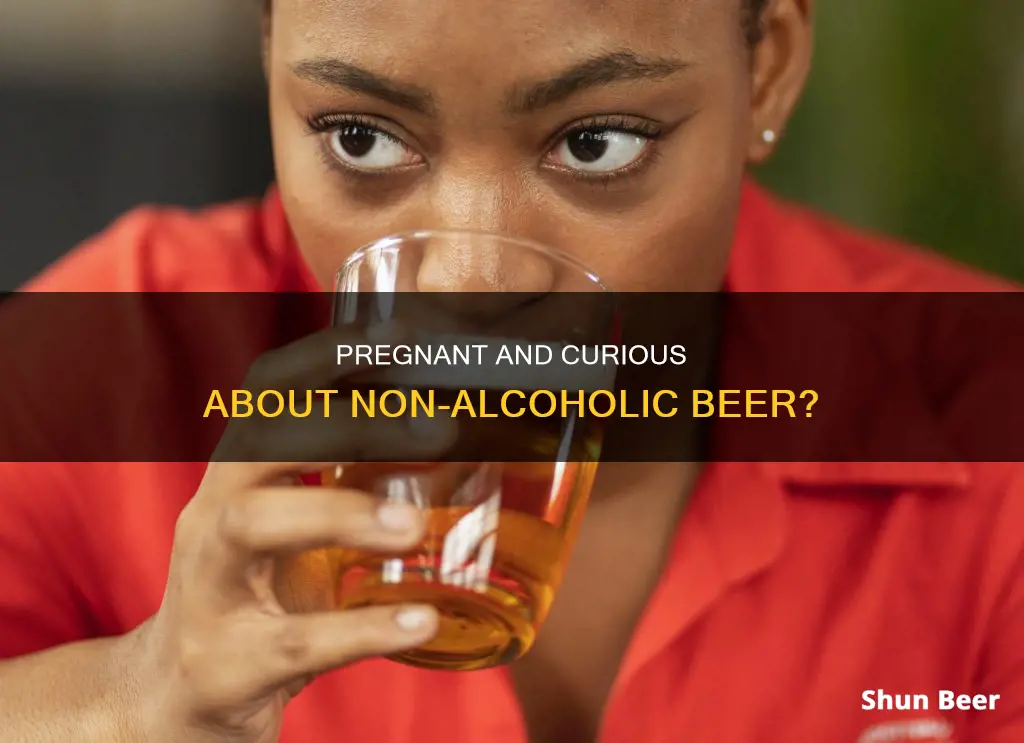
Pregnancy is a time when women are advised to be cautious about what they consume, and alcohol is typically on the do not consume list. As a result, non-alcoholic beer has emerged as a popular alternative for women who want to experience the taste of beer without the potential risks of alcohol. However, the question remains: is it safe to drink non-alcoholic beer during pregnancy?
What You'll Learn

Is non-alcoholic beer safe during pregnancy?
Pregnancy is a time when many women are extra cautious about what they consume, and for good reason. Alcohol consumption during pregnancy is known to be associated with an increased risk of miscarriage, stillbirth, and premature birth, as well as fetal alcohol spectrum disorders (FASD). Due to these risks, health professionals and organisations such as the American College of Obstetricians and Gynecologists (ACOG) and the Centers for Disease Control and Prevention (CDC) recommend complete abstinence from alcohol during pregnancy.
So, what about non-alcoholic beer? Can it be a safe alternative for pregnant women who want to enjoy the taste of beer without the risks associated with alcohol?
Non-alcoholic beer is legally defined as a beverage with less than 0.5% alcohol by volume (ABV). However, it's important to note that this doesn't mean it is entirely alcohol-free. Some non-alcoholic beers may contain up to 0.5% ABV, which is still a minimal amount of alcohol.
There is limited research on the safety of consuming non-alcoholic beer during pregnancy. While some experts argue that the trace amounts of alcohol in non-alcoholic beer are similar to the naturally occurring alcohol in certain foods like ripe bananas and fruit juices, others caution that there is a chance the drinks contain more alcohol than advertised. A 2010 study found that 29% of the "no or low alcohol" drinks examined contained higher ethanol levels than declared on their labels, with some even reaching 1.8% ABV.
The American College of Obstetrics and Gynecology (ACOG) maintains that no amount of alcohol during pregnancy is considered safe. On the other hand, the Center of Disease Control (CDC) notes that there is no known safe amount of alcohol consumption during pregnancy, but it does not explicitly state that non-alcoholic beverages should be avoided.
Ultimately, the decision to consume non-alcoholic beer during pregnancy is a personal one and should be made in consultation with a healthcare provider. While non-alcoholic beer may be a helpful tool for pregnant women trying to quit alcohol, it is important to read labels carefully and be aware of the potential risks associated with even small amounts of alcohol.
To completely eliminate the risks associated with alcohol consumption during pregnancy, it is recommended to choose beverages labelled as "alcohol-free" or "0.0% ABV". These drinks have zero detectable alcohol and are considered safe for pregnant women.
Beer Left Out Overnight: Is It Safe to Drink?
You may want to see also

What is non-alcoholic beer?
Non-alcoholic beers are designed to match the taste, look, and feel of standard beers. They are made using the same ingredients as standard beer, lager, and ale – water, malt, hops, and yeast. There are several ways to control or reduce the alcohol content in non-alcoholic beers:
- The brewing process is controlled, using special non-fermenting ingredients to stop the amount of alcohol in the beer from exceeding 0.5% ABV.
- Alcohol is removed by heating the drink until the alcohol evaporates.
- The beer is passed through a fine mesh to remove the alcohol and leave the other flavored parts behind (a process called reverse osmosis).
- The beer is blended with something non-alcoholic, for example, 'radler' beers and shandy are pre-mixed with lemon or other flavored soda.
In the US, beverages can claim to be non-alcoholic as long as they don't exceed 0.5% ABV. However, it's important to note that there is a chance that these drinks contain more alcohol than advertised. For instance, a 2010 study found that 29% of the beverages "contained ethanol levels higher than the declared concentration on their label." Six beverages marketed as having 0% alcohol actually had more than 1% ethanol, with some even containing up to 1.8%.
While non-alcoholic beer has less alcohol than regular beer, it's important to remember that it still contains trace amounts of alcohol. Therefore, it may not be suitable for those who need or want to avoid alcohol completely, such as pregnant individuals. The American College of Obstetrics and Gynecology (ACOG) states that no amount of alcohol during pregnancy is considered safe. However, some sources suggest that the trace amounts of alcohol in non-alcoholic beer are similar to the amounts found in many fresh fruits and juices, such as apple juice and ripe bananas. Ultimately, the decision to consume non-alcoholic beer during pregnancy should be made in consultation with a healthcare professional.
Beer and Methylprednisolone: Is It Safe to Drink?
You may want to see also

What are the risks of drinking alcohol during pregnancy?
Drinking alcohol during pregnancy can have serious adverse effects on the health of the foetus. The American College of Obstetrics and Gynecology (ACOG) says that no amount of alcohol during pregnancy is considered safe. This is because alcohol is linked to behavioural and learning difficulties, birth defects, fetal alcohol spectrum disorder (FASD), and other risks.
Fetal Alcohol Spectrum Disorder (FASD) is an umbrella term for the physical, cognitive, and behavioural complications that can occur in neonates exposed to alcohol in the womb. The most severe form of FASD is Fetal Alcohol Syndrome (FAS), which includes dysmorphic facial features such as a flat midface with short palpebral fissures, a flat philtrum, and a narrow vermilion border of the upper lip. FAS can also cause growth retardation and serious neurodevelopmental disorders.
Even light drinking during early pregnancy can be risky because there is no clear line between "light" and "moderate" drinking, and no guidelines indicate how much alcohol is safe. Therefore, most experts recommend complete abstinence from alcohol during pregnancy.
The effects of alcohol consumption on the body include:
- Interference with the brain's communication pathways, impacting mood, behaviour, clear thinking, and coordination.
- Damage to the heart, leading to cardiomyopathy, arrhythmias, and high blood pressure.
- Liver inflammation and problems such as steatosis, or fatty liver.
- Pancreas inflammation, which can lead to pancreatitis, causing swelling, pain, and impaired enzyme and hormone production.
- Increased risk of several types of cancer, including head and neck cancer, esophageal cancer, and breast cancer.
- Weakening of the immune system, making the body more susceptible to diseases like pneumonia and tuberculosis.
- Digestive issues such as nausea, vomiting, diarrhoea, and indigestion.
- Increased risk of accidents, injuries, violence, unsafe sex, and social problems.
Drinking Beer at Wegmans: What Shoppers Need to Know
You may want to see also

What are the downsides of quitting drinking?
While quitting drinking can have many benefits, there are some downsides to the process. Firstly, for heavy drinkers, quitting can lead to withdrawal symptoms such as cold sweats, a racing pulse, nausea, vomiting, shaky hands, and intense anxiety. In severe cases, withdrawal can even lead to seizures or hallucinations. These physical symptoms can last for up to two weeks and are followed by non-physical symptoms like cravings and a desire for the comfort that alcohol provides.
Additionally, quitting drinking can be challenging, especially if alcohol is a central part of one's social life. It may require discussing one's plan with a doctor and undergoing a medically-supervised detox to ensure safety and comfort during the withdrawal process.
Furthermore, some people may find that quitting alcohol interferes with their social dynamics and cultural factors around meals, mildly affecting their routine of stress management.
Finally, while quitting alcohol can improve relationships, it can also strain or destroy them if the people around an individual feel like they are choosing an addiction over their loved ones. It's important to communicate and seek support during this challenging time.
Beer and Suboxone: Is It Safe to Mix?
You may want to see also

What are the best non-alcoholic beers for pregnancy?
If you're looking for non-alcoholic beers to drink during pregnancy, it's important to know that there is limited research on the safety of consuming these drinks while pregnant. The American College of Obstetrics and Gynecology (ACOG) maintains that no amount of alcohol during pregnancy is considered safe due to potential links to behavioural and learning difficulties, birth defects, and fetal alcohol spectrum disorder (FASD).
With that in mind, let's look at some non-alcoholic beer options that are often discussed in the context of pregnancy:
Heineken 0.0%
Heineken 0.0% is often mentioned as a non-alcoholic beer option during pregnancy. While it claims to have 0% ABV, some sources advise treating it with caution as beers labelled as alcohol-free can still contain trace amounts of alcohol.
Bud Zero
Bud Zero is another non-alcoholic beer that claims to have 0% ABV. However, similar to Heineken 0.0%, it is subject to the same considerations regarding potential trace amounts of alcohol.
Hairless Dog
Hairless Dog offers a range of non-alcoholic beer options. While most of their products have slight amounts of alcohol due to fermentation, some of their beers are completely alcohol-free.
Grüvi Prosecco & Rosé
Grüvi Prosecco and Bubbly Rosé are alcohol-free options made without any fermentation, ensuring they contain no alcohol whatsoever. These can be great choices for baby showers, brunches, and celebrations during pregnancy. You can also get creative and mix the Prosecco with orange juice for a delicious mocktail.
Remember, the decision to consume non-alcoholic beer during pregnancy is a personal one and should be made in consultation with your doctor. The information provided here is not medical advice and should not replace the guidance of a qualified healthcare professional.
Enjoying Beer While Watching Champions League Games
You may want to see also
Frequently asked questions
There is no clear answer to this question. While non-alcoholic beer contains very little alcohol, there is a chance it may contain more alcohol than advertised. The American College of Obstetrics and Gynecology (ACOG) says that no amount of alcohol during pregnancy is considered safe. However, the amount of alcohol in non-alcoholic beer is negligible and may be less than what is present in some everyday food items. It is important to read labels and consult a healthcare provider before consuming non-alcoholic beer during pregnancy.
Alcohol consumption during pregnancy can lead to an increased risk of miscarriage, stillbirth, and premature birth. It can also cause Fetal Alcohol Spectrum Disorders (FASD), which include physical, mental, and behavioural impairments in children.
There are many non-alcoholic alternatives to beer during pregnancy, including mocktails, alcohol-free drinks, and non-alcoholic wines and spirits. It is important to read labels and consult a healthcare provider before consuming any non-alcoholic beverage during pregnancy, as some may contain ingredients that are not safe for pregnant women.







